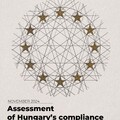After the European Commission launched the conditionality procedure based on Regulation 2020/2092 and the European Council decided to suspend EU funds to Hungary in December 2023, the Hungarian Government has started to submit laws to address EU concerns regarding breaches of the principles of the rule of law in Hungary. The adopted laws amended the Act CXII of 2011 on the right to informational self-determination and on the freedom of information on several points. The changes have come into force in different stages from October 2022 to March 2023. K-Monitor’s report aims to present the changes the new laws have brought and to assess their impact on Freedom of information in Hungary. The report also contains recommendations to address the weaknesses and shortcomings of the new laws.

The main findings of the report
Proactive disclosures
Assessment
The newly established Register has a limited scope compared to the already existing, but not widely used public data site run by the Government (kozadat.hu). Not all public bodies are obliged to provide data into the Register. Only public bodies having a budgetary status under the Public Finance Act fall under the scope of the new disclosure rules. Municipalities, public interest trusts (for example Mathias Corvinus Collegium Foundation) state-owned or municipally owned companies (for example Hungarian National Asset Management Inc., or the Hungarian Tourism Agency), the Hungarian National Bank are not required to provide data to the Register. This exempts a great share of institutions spending vast amounts of national and EU funds from the new repository. The bodies falling out of the scope of the new law are still obliged to publish data in accordance with the so-called General Disclosure List set out in Annex 1 to the FOI Act, but non-compliance is not sanctioned by any institution. Although the new law requires data to be uploaded in a readable and searchable format, it is not easy for citizens to find information in the Registry. The search engine only allows looking up the institutions uploading data, but not the companies that received contracts. This would have been the greatest benefit of the new platform. Furthermore different bodies only bi-monthly upload the prescribed data in separate documents, that are not accessible in bulk. The files can only be downloaded separately and after filling out captchas. Information on contracts is also hardly comparable. Allowing data holders to opt out from data publication on their own website without the need to direct users to the Register ultimately fragments the disclosures, and citizens will have to spend even more time to find the information they are looking for.
Legal remedies attached to proactive disclosures
Assessment
Many public bodies that use public money, but do not have budgetary status, cannot be subject to the newly established transparency procedure ending in a sanction. In the case of bodies without budgetary status, the legislation does not even provide any effective means (order, fine) to take action against the bodies failing to publish data. If it is not about a body with budgetary status, the Authority’s new power cannot be triggered. As a consequence, the Authority's tools are sharply differentiated depending on whether a body has a budgetary status or not. Non-budgetary bodies have fewer obligations and, even if they do not comply with them, the Authority can only send them or their supervisory body a polite letter to remedy the failure to disclose data.
Recommendations to proactive disclosures
- The Register should not substitute proactive data disclosure on the website of public bodies.
- The Register should publish data of all entities performing a public duty as such entities have already an existing obligation to proactively disclose information pursuant to Annex 1 of the FOI Act (municipalities, public interest trusts, corporate entities owned by the state or municipalities).
- Beneficial ownership information of private bodies contracted by entities performing a public duty or becoming beneficiaries of public funds should be published along with names of entities contracted by bodies subject to the FOI Act.
- Besides meta data on contracts the Register should also publish full contracts and in a machine readable format.
- The Register should provide a comprehensive and searchable database of all the uploaded data allowing to seek data easily and to download it only in a few steps.
- Contracts of which data are not published in the Register should be deemed null and void.
Reactive disclosures
Assessment
A welcomed change is that public bodies cannot delay responses to FOI requests by 90 days, which became a widely used practice under the pandemic. It is also in the interest of the data requester that public bodies cannot ask for a fee in exchange for the data. This is a change that could encourage bodies to keep better, more easily accessible records of their data. However, there are already bad practices spreading that need to be followed up in the future. Public bodies should not claim that they only provide insight into the requested data if the data requester appears in person. This has already been clearly ruled by the Kúria, the highest court of Hungary.
Legal remedies to reactive disclosures
Assessment
The new litigation rules have significantly speeded up access to information. It can take months to close a court case instead of the year and a half it used to take. Speeding up the procedure is principally welcome. Early experience shows that the Budapest-Capital Regional Court is very serious about keeping the fast-track deadlines. However, the fast-track rules can in many cases be burdensome for the data requester.
Under the new rules, it is permitted for the defendant to present its defense orally at the first hearing. In such a situation, the data requester cannot prepare effectively and has to develop their arguments right at the hearing. Adjournment of the hearing in such a case is also only possible in exceptional circumstances.
Under the new rules, there is a greater need for preparation and representation by a lawyer, which makes access to justice more costly. First, because of the fast-track procedure, lawyers need to be available on a more flexible basis while the case is running. Second, because of the importance of the first hearing, legal expertise is necessary even in cases which representation is not required by law in.
Short deadlines can also be a challenge for courts when hundreds of pages of documents have to be reviewed and assessed properly within the 15-day timeframe. There is no data available on whether court capacities (staff, courtrooms) have been strengthened to cope with the new rules. Time pressure on judges might decrease the quality of justice.
A stay of the proceedings cannot be requested even at the joint request of the parties, which precludes the parties from having time to make a settlement.
The fact that trade secret holders can be involved in the procedure could be justified, but it brings a number of risks for citizens. The increased number of defendants and the risk of high legal costs may discourage data requesters from turning to court. While there have been examples of corporates intervening in the lawsuit to protect their trade secret, there have been no examples of the Authority acting in support of the data requester fighting for transparency.
Despite significantly speeding up the procedure before ordinary courts, there is still no rule on the time limit for the HCC to rule on FOI cases upon a constitutional complaint. After a lost FOI case, it can take years for the HCC to rule on the case, at a time when the data being sued for lost its significance.
Although the new rules were adopted for the interest of the data requester, they failed to address a number of problems that had been clear for years. The new rules are not intended to address either the poor response practices of data controllers, the quality of justice or citizens’ access to justice in FOI cases.
Recommendations to reactive disclosures
- The defendant should not be allowed to change the ground for rejecting the FOI request that it communicated to the data requester before the lawsuit.
- If the defendant submits that it does not process data, it should be obliged to state which public body is competent for the data pursuant to the Tromso Convention.
- The defendant should file a statement of defense before the first hearing.
- The defendant should not be allowed to change its defense during the trial.
- With the consent of the parties, the court should be given the option to override the 15-days-time frame for hearings and schedule the hearing for a later date.
- The court should be allowed to order a stay of proceedings if the parties jointly request it.
- General rules of submitting evidence should apply in FOI litigation.
- Rules allowing for proportionality should apply to the legal costs of intervening defendants protecting trade secrets, so that the amount of legal costs does not deter citizens from going to court.
- Companies contracting with the public sector should be allowed to be sued, given that the HCC has already ruled in 2020 that it is unconstitutional that the FOI Act does not allow lawsuits to be filed against companies.
- A time limit should be set for the HCC when deciding on FOI cases.
The report and its annexes can be accessed here.
This project was funded by the German Marshall Fund of the United States. Opinions expressed in this publication do not necessarily represent those of the German Marshall Fund of the United States or its partners.
Címkék: english
Szólj hozzá!
A bejegyzés trackback címe:
Kommentek:
A hozzászólások a vonatkozó jogszabályok értelmében felhasználói tartalomnak minősülnek, értük a szolgáltatás technikai üzemeltetője semmilyen felelősséget nem vállal, azokat nem ellenőrzi. Kifogás esetén forduljon a blog szerkesztőjéhez. Részletek a Felhasználási feltételekben és az adatvédelmi tájékoztatóban.





